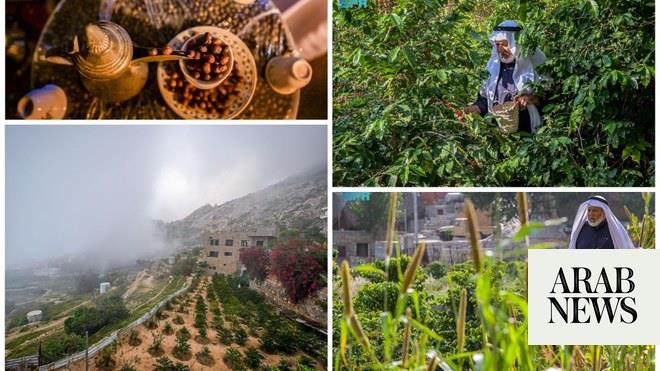
RIYADH: The Shada mountains, in the highlands of Al-Baha, always have the alluring aroma of coffee in the air.
The coffee shrubs on the Shada Al-Asfal and Shada Al-Ala mountains produce a distinct type of bean that has become an in-demand commodity in the country.
Scattered across these mountains are farms that have over 54,000 trees, which yield more than 12 tons annually.
Over 280 farmers are involved in this enterprise, according to statistics from the Ministry of Environment, Water and Agriculture branch in Baha.
The twin mountains, part of a mountain range amidst a series of low plains and valleys, are the highest peaks in the Tihama plain.
Shada Al-Ala reaches an elevation of 2,200 meters, while Shada Al-Asfal stands at around 1,500 meters.
Agriculture on these mountains extends to other produce, but the primary crop is coffee.
Remarkable methods are used for the care of the coffee trees. The plants are watered by storing rainwater in hollow rocks strung together to resemble tanks, as explained by Ali Al-Ghamdi, the owner of a farm on Shada Al-Asfal mountain.
His farm has around 700 Shada coffee trees. The plants receive meticulous care, as well as the planting, drying and processing, he said.
The price of Shada coffee ranges between SR100 ($26) and SR150 per kilogram.
From Shada Al-Asfal to Shada Al-Ala, some trees that have stood for over 150 years still yield coffee.
Some 300 of them are carefully tended by Abdullah Al-Shadawi, who has followed in the farming footsteps of his ancestors. He said there is a significant yield yearly because of the fertile soil.
Fahad Al-Zahrani, director of the ministry’s Baha region, said the government provides considerable support for the farmers to meet their targets.
Al-Zahrani said the ministry distributes around 80 liters of insecticides annually to farmers, and that the reclamation project, of agricultural terraces, on both mountains has benefited 93 farmers.
There are 125 agricultural terrace reservoirs, 83 in Shada Al-Asfal and 42 in Shada Al-Ala.
The ministry has established a Coffee City project in the north of Baha, covering an area of 1.6 million square meters, which aims to create 1,000 jobs and ensure the cultivation of 300,000 coffee trees.












